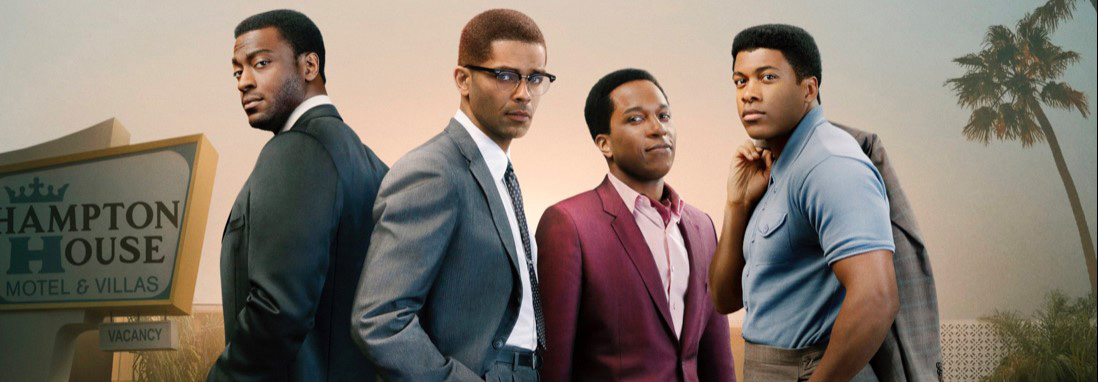
In Here and Out There: “Eyes on the Prize” and Current Films
In celebration of Black History Month, we are taking a closer look at some of the Eyes on the Prize Interviews housed in Washington University Libraries’ Film & Media Archive. A selection of these interviews is applicable to two recent, critically acclaimed films: One Night in Miami and Judas and the Black Messiah.
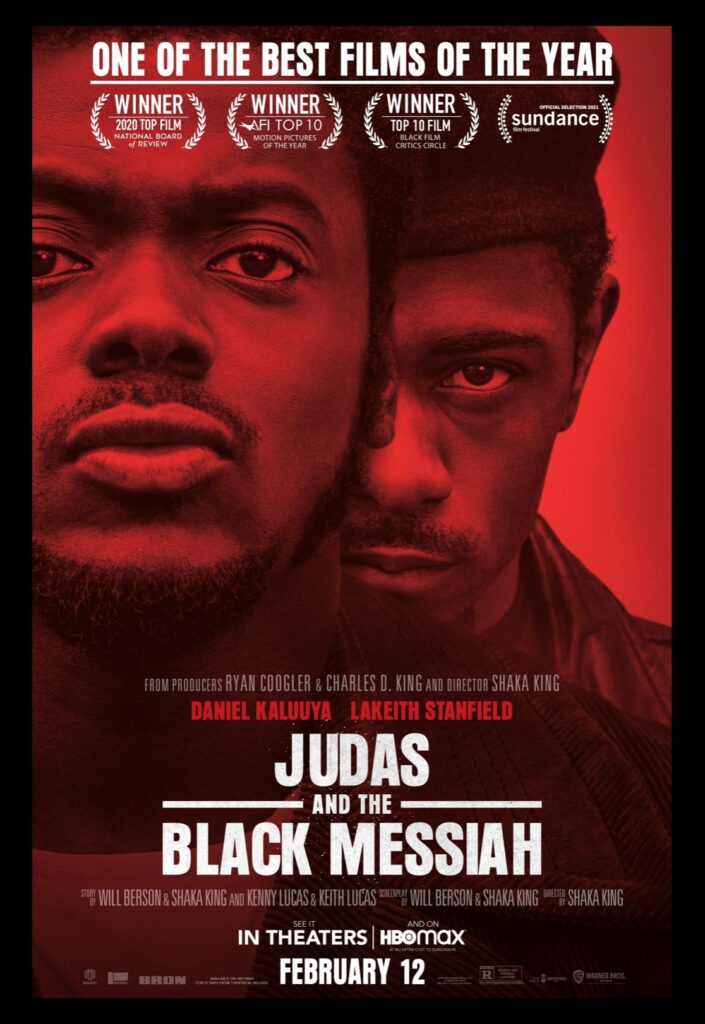
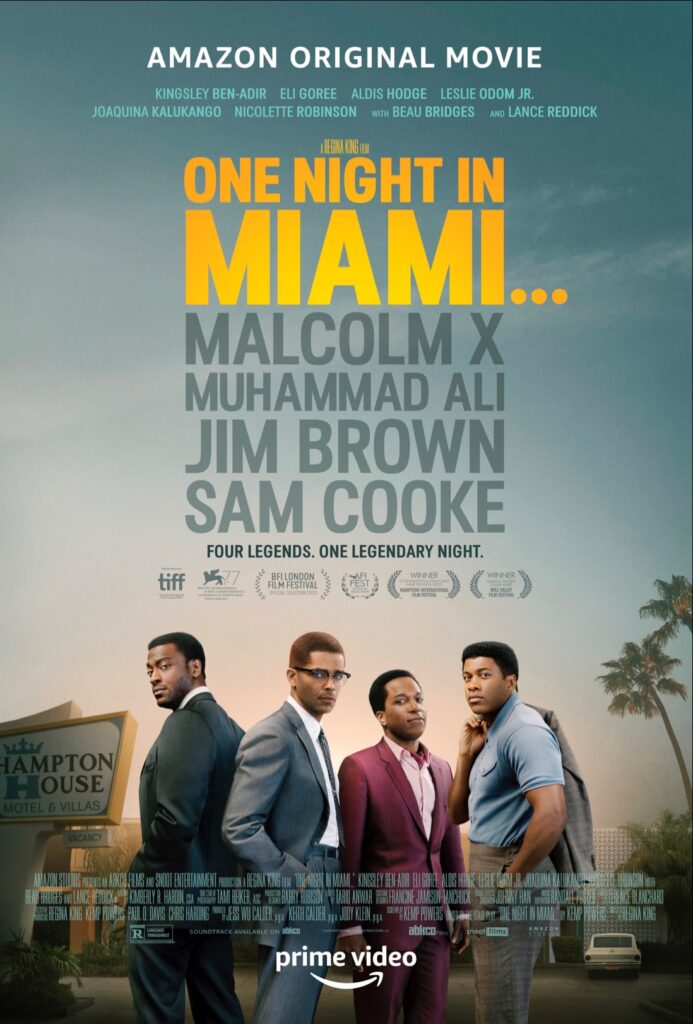
One Night in Miami, directed by Regina King, is a film adaptation of the stage play of the same name. Written by Kemp Powers, the play portrays the events of the evening of February 25, 1964. Four black American icons—Muhammad Ali (then known as Cassius Clay), Malcolm X, singer/songwriter Sam Cooke, and NFL running back Jim Brown—gather together in a hotel room to celebrate Clay’s victory in the boxing championship earlier that night.
Each of these figures is at a tipping point in his life. Clay is on the cusp of announcing his involvement with the Nation of Islam and his new identity as Muhammad Ali, while Malcolm X is preparing to break away from the Nation of Islam and publicly renounce it. Jim Brown is considering trading in his hugely successful NFL career for a career in Hollywood, and Sam Cooke is grappling with his role in the civil rights movement, up till now kept out of the public eye.
What follows is an evening of brutally honest dialogue regarding how to live and interact with white society as black men, particularly as black men who’ve “made it.” The underlying tension stems from the role these four men have as celebrities, and what kind of responsibility they have to the broader black community “out there.” The film was released on Prime Video last month and is currently up for three Golden Globes.
Click here to watch the trailer for One Night in Miami
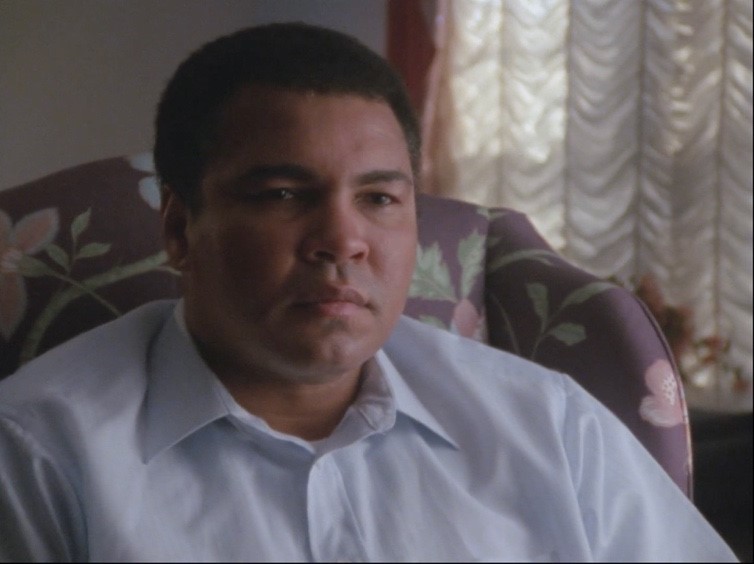
If you would like to know more about the subjects of One Night in Miami, the Washington University Libraries’ Film & Media Archive holds interviews with two of these four men in the Henry Hampton Collection: Muhammad Ali and Jim Brown. The interview with Muhammad Ali was filmed for the documentary Eyes on the Prize II, released in 1990, and the interview with Jim Brown is part of the William Miles Collection filmed for the documentary series Black Champions. More than 20 years after the events of the film, Ali and Brown discuss their history with the Nation of Islam and the civil rights movement, respectively, touching on the same subjects their fictional portrayals grapple within the film.
The underlying tension between the subjects of One Night in Miami surrounds the question of “out there,” that is, the system of racism threatening black people across the nation. Judas and the Black Messiah is the story of this “out there.” Set in the violent political landscape of Chicago in 1969, a mere five years after One Night in Miami, the film tells the story of the murder of Fred Hampton.
In the 1960s, the Black Panther Party, a black separatist group, was rapidly expanding in the U.S. In 1968, 20-year-old Fred Hampton joined the Black Panther Party in Chicago and soon rose to the rank of Chairman of the Illinois chapter and Deputy Chairman of the national Black Panther Party. Hampton was a gifted speaker and accomplished several key achievements lending to the party’s growth, including setting up a free breakfast program for black children in Chicago and negotiating alliances with various multiracial community activist groups across the city, forming a “Rainbow Coalition.”
Hampton’s success with the Black Panther Party led the FBI to regard him as a very serious threat. In the early hours of December 4, 1969, Fred Hampton was murdered in his apartment in a raid by the Chicago Police Department. Also in the apartment was Hampton’s fiancée, Deborah Johnson, now known as Akua Njeri, who was eight months pregnant at the time. Johnson survived and was later interviewed by Blackside for Eyes on the Prize II.
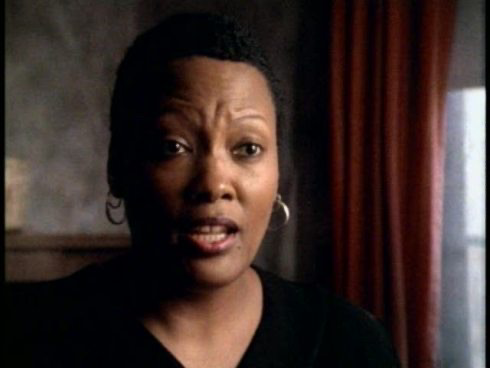
Judas and the Black Messiah, directed by Shaka King, chronicles the events leading up to Fred Hampton’s death and the key role played by FBI informant William O’Neal, who served as a member of the Black Panther Party and was compensated by FBI agent Ron Mitchell for information on the party’s activities.
O’Neal was recruited by the FBI at age 17 when he was arrested for stealing a car and driving it over state lines. Given the choice of serving time for the car theft or becoming an informant in the Black Panther Party, O’Neal joined the Black Panther Party and served as Head of Security. He provided the FBI with the layout of Hampton’s apartment and most likely drugged Hampton on the night of the raid.
Judas and the Black Messiah was released on February 12, 2021, and is currently in theaters and on HBO Max. In addition, it is up for two Golden Globes, with Daniel Kaluuya being nominated for his portrayal of Fred Hampton. Interestingly, Leslie Odom Jr. is up for the same category for his portrayal of Sam Cooke in One Night in Miami.
Click here to watch the trailer for Judas and the Black Messiah
Also part of the Film & Media Archive’s Eyes on the Prize Interviews is an hour-long interview with William O’Neal. Filmed less than a year before his death, the footage is the only interview O’Neal ever did, and it details his history with the FBI and the Black Panther Party.
The footage from this interview was utilized in Judas and the Black Messiah. In an interview with Vulture, co-writers and producers Keith and Kenny Lucas discuss reading a transcript of an interview with O’Neal and how that transcript helped inform their portrayal of his character. In addition, footage from the interview was used by the production company for use in the film. The movie opens with a recreation of a clip of O’Neal’s interview. O’Neal, played by Lakeith Stanfield, squirms when asked what he would tell his son about his involvement in Fred Hampton’s death. Additionally, the film concludes with a clip of the actual interview.
For more information about the Eyes on the Prize interviews and the Henry Hampton Collection, contact the Film & Media Archive Curator Andy Uhrich.
Sources: Bros., Glen Wilson/Warner. “Finding the Judas in Judas and the Black Messiah.” Vulture, February 10, 2021. https://www.vulture.com/2021/02/how-the-lucas-brothers-wrote-judas-and-the-black-messiah.html.
